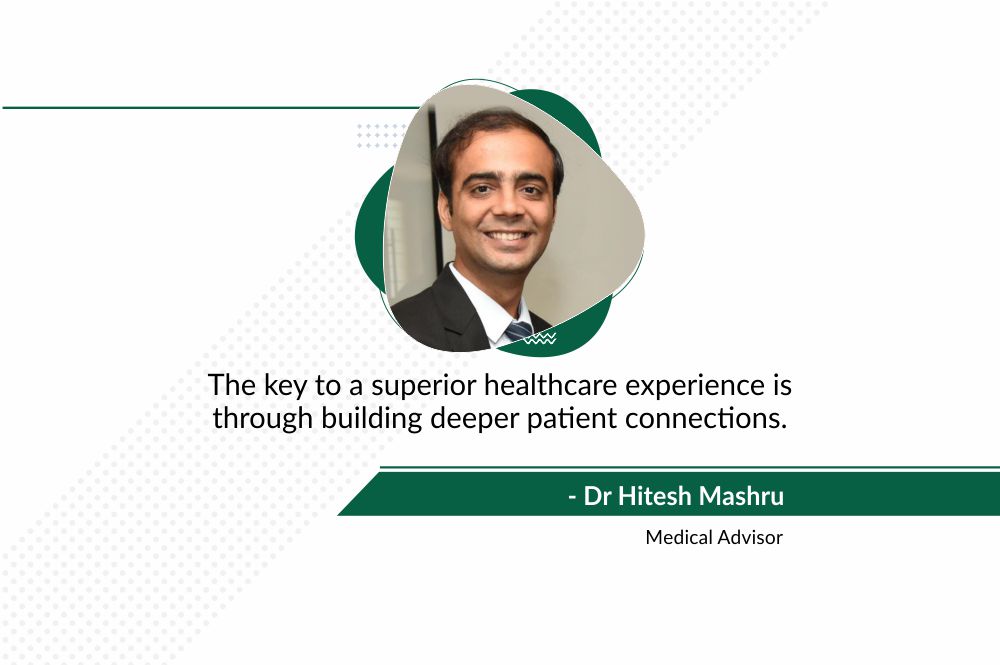- Home
- Innovation Patient Centricity- The Way Forward for Healthcare Community


Patient Centricity- The Way Forward for Healthcare Community
6th Nov, 2020
In today’s evolving life sciences market, digitalisation is playing a key role. This makes patient centricity a central imperative for every industry stakeholder. The patient today is more empowered and involved in the healthcare decision making process. This has not only accelerated the digital adoption in the life sciences industry but also forced the healthcare stakeholders to start thinking differently. The rise in the number of innovations, convenience of consumers, the demands of healthcare payers and other customers of the pharma industry has changed. Decisions are becoming more data led. Medication efficacy and compliance, improved patient handling and quality of life are a few aspects where digitalisation is playing a bigger role. Dr Hitesh Mashru, shares his views on the increasing trend of patient centricity and the role digitalization is playing for better patient care.
Life science organizations are looking for different avenues to utilise digital engagement to help understand the new behaviour and journey of the patients they help. This means the organizations need to build patient-centric strategies for operating in the evolved, digital ecosystem. Some of the key aspects to keep in mind are- Patient Engagement and Leveraging New Technology.
Patient Engagement
Patient engagement is a key focus area. Engagement gives way to valuable real-world data and insight into therapy performance and medication adherence. Rise of new challenges like globalization, greater supply chain complexity, personalized medicine, compliance, chronic disease management amongst others will be greatly impacted by digital transformation.
Patient portals for fully engaged enrolment and participation in clinical trials are a good starting point for engaging with patients. Using it as a scalable information centre throughout the patient journey, patients can access disease and drug details, treatment education, and medication training easily from any device.
Using common platforms like mobile applications, social media and patient communities for patient support programs across therapeutic brands helps in creating a single view of the patient. This drives awareness and support for programs while increasing loyalty, prescribing habits, and serves as a model for patient engagement at scale. These can be also used to deliver personalized messages based on their online behaviour or disease state.
Leveraging upcoming technology
This revolution has given rise to Pharma Internet of Things. Pharma IoT mainly revolves around smart connected medical devices, applications and cloud services in creating patient medical record database, drug development, clinical trials and patient care. Pharmaceutical companies want to understand how patients respond to therapies and identify subpopulations to ultimately improve health outcomes. This can be created by developing closer patient connections.
Artificial Intelligence (AI) platforms can help understand and predict the behaviour of the patients. This can aid to understand the gaps in the life cycle of the products and the insights can be further used for research and development.
Patients are, indeed, at the heart of digital strategies and innovation plans. This means patient engagement means creating opportunities for closer connections. It includes open lines of communication, advice, resources, and support for the duration of a patient’s participation in a clinical trial, patient support program, patient advocacy groups and social media patient engagement through their ongoing therapeutic journey. In the new paradigm of value-based healthcare, the industry is increasingly looking into the game-changing potential of digital advances to maximize clinical and financial outcomes and boost patient satisfaction.
The Government of India has been increasingly focusing on Digital Health to bring about improvements in the Indian public healthcare delivery. Various initiatives have been undertaken to ensure undisrupted flow of care and other associated benefits like the creation of Electronic Health Records, Medical Health Directories, Vaccine Tracker Mobile Application apps, Online Registration System, National Health Portal, Telemedicine projects, Stress Management Apps and others.
Leveraging the latest digital technologies to provide better, affordable care for the patients is the need for tomorrow. The innovation space has shifted from products and delivery systems to patients. When the industry starts focussing on ‘beyond-the-pill’ care for the patients, we can build more fruitful and long-lasting relations.
Array ( )
To give you the best possible experience every time you visit our site, we use cookies to identify and store your preferences on your browser. Continuing to browse our site means that you are "ok" with this. Learn more about our privacy policy.
Okay

